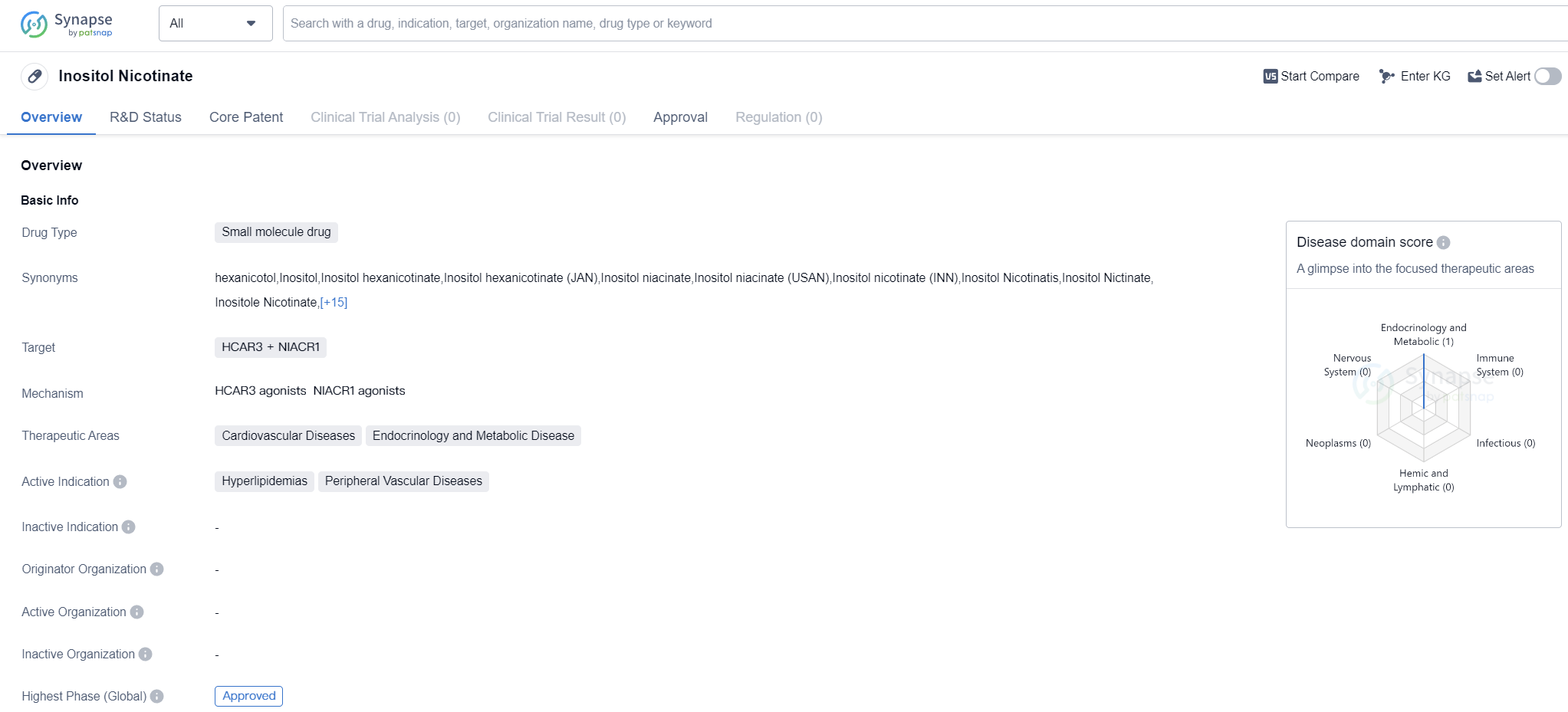Decoding inositol nicotinate: A Comprehensive Study of its R&D Trends and Mechanism on Drug Target
Inositol nicotinate's R&D Progress
Inositol Nicotinate is a small molecule drug that targets HCAR3 and NIACR1 receptors. It is primarily used in the treatment of cardiovascular diseases, endocrinology, and metabolic diseases. The drug is specifically indicated for the management of hyperlipidemias and peripheral vascular diseases.
The highest R&D phase of this drug is approved. This indicates that it has successfully completed clinical trials and has been deemed safe and effective for use in patients. Additionally, it has also received approval in China, further validating its efficacy and safety profile.
The drug's mechanism of action involves targeting the HCAR3 and NIACR1 receptors. HCAR3 is a receptor involved in lipid metabolism, while NIACR1 is a receptor associated with the regulation of glucose and lipid metabolism. By targeting these receptors, Inositol Nicotinate aims to regulate lipid and glucose levels, thereby improving cardiovascular health and metabolic function.
The therapeutic areas of cardiovascular diseases, endocrinology, and metabolic diseases are highly prevalent and pose significant health risks worldwide. Cardiovascular diseases, such as hyperlipidemias, are characterized by abnormal lipid levels in the blood, which can lead to conditions like atherosclerosis and heart disease. Peripheral vascular diseases, on the other hand, involve the narrowing or blockage of blood vessels outside the heart and brain, often leading to reduced blood flow and tissue damage.
Inositol Nicotinate offers a promising treatment option for patients suffering from these conditions. Inositol Nicotinate has reached the highest phase of development which is approved globally. By effectively targeting the HCAR3 and NIACR1 receptors, the drug has the potential to regulate lipid and glucose metabolism, thereby improving cardiovascular health and metabolic function.
👇Please click on the image below to directly access the latest data (R&D Status | Core Patent | Clinical Trial | Approval status in Global countries) of this drug.
Mechanism of Action for inositol nicotinate: HCAR3 agonists NIACR1 agonists
HCAR3 agonists and NIACR1 agonists are terms related to biomedicine.
HCAR3 (Hydroxycarboxylic Acid Receptor 3) is a receptor protein that is expressed in various tissues, including adipose tissue, immune cells, and the central nervous system. It is involved in regulating metabolic processes and immune responses. HCAR3 agonists are compounds or drugs that bind to and activate HCAR3, leading to specific cellular responses mediated by this receptor. These agonists can potentially be used for therapeutic purposes to modulate metabolic and immune functions.
NIACR1 (Nicotinic Acid Receptor 1), also known as GPR109A, is another receptor protein found in adipose tissue, immune cells, and other tissues. It plays a role in regulating lipid metabolism and inflammation. NIACR1 agonists are compounds or drugs that bind to and activate NIACR1, triggering specific cellular responses mediated by this receptor. These agonists have been explored for their potential in treating dyslipidemia (abnormal lipid levels) and inflammatory conditions.
In summary, HCAR3 agonists and NIACR1 agonists are compounds or drugs that activate the respective receptors HCAR3 and NIACR1, which are involved in regulating metabolic and immune functions.
Drug Target R&D Trends for inositol nicotinate
HCAR3 (Hydroxycarboxylic acid receptor 3) and NIACR1 (Nicotinic acid receptor 1) are G-protein coupled receptors that play crucial roles in the human body. HCAR3 is primarily expressed in adipose tissue and immune cells, while NIACR1 is found in various tissues including adipose tissue, liver, and skeletal muscle. Activation of HCAR3 by specific ligands, such as β-hydroxybutyrate, regulates adipocyte lipolysis and glucose homeostasis. NIACR1, on the other hand, is involved in the regulation of lipid metabolism, glucose uptake, and insulin sensitivity. Understanding the functions of HCAR3 and NIACR1 can provide valuable insights for the development of therapeutic interventions targeting metabolic disorders and immune-related diseases.
According to Patsnap Synapse, as of 12 Sep 2023, there are a total of 10 HCAR3 + NIACR1 drugs worldwide, from 20 organizations, covering 30 indications, and conducting 222 clinical trials.
The analysis of target HCAR3 + NIACR1 reveals a competitive landscape with companies like Katakura Industries Co., Ltd., Astellas Pharma, Inc., and Tianjin Handewei Pharmaceutical Co. Ltd. leading the way with approved drugs. These companies have made significant progress in the research and development of drugs targeting HCAR3 + NIACR1. The approved indications cover a wide range of conditions related to lipid metabolism, vascular health, and skin disorders. Small molecule drugs are the most rapidly progressing drug type for this target. China, Canada, European Union, United Kingdom, Japan, and Lebanon are the countries/locations that have shown the fastest development under the current targets. China, in particular, has made notable progress in the development of drugs for HCAR3 + NIACR1.
👇Please click on the picture link below for free registration or log in directly if you have a freemium account, you can browse the latest research progress on drugs, indications, organizations, clinical trials, clinical results, and drug patents related to this target
Conclusion
In summary, Inositol Nicotinate is a small molecule drug that targets HCAR3 and NIACR1 receptors. It is approved for the treatment of hyperlipidemias and peripheral vascular diseases in global markets. With its mechanism of action and therapeutic areas, the drug holds promise in addressing the significant health risks associated with cardiovascular diseases, endocrinology, and metabolic diseases.






